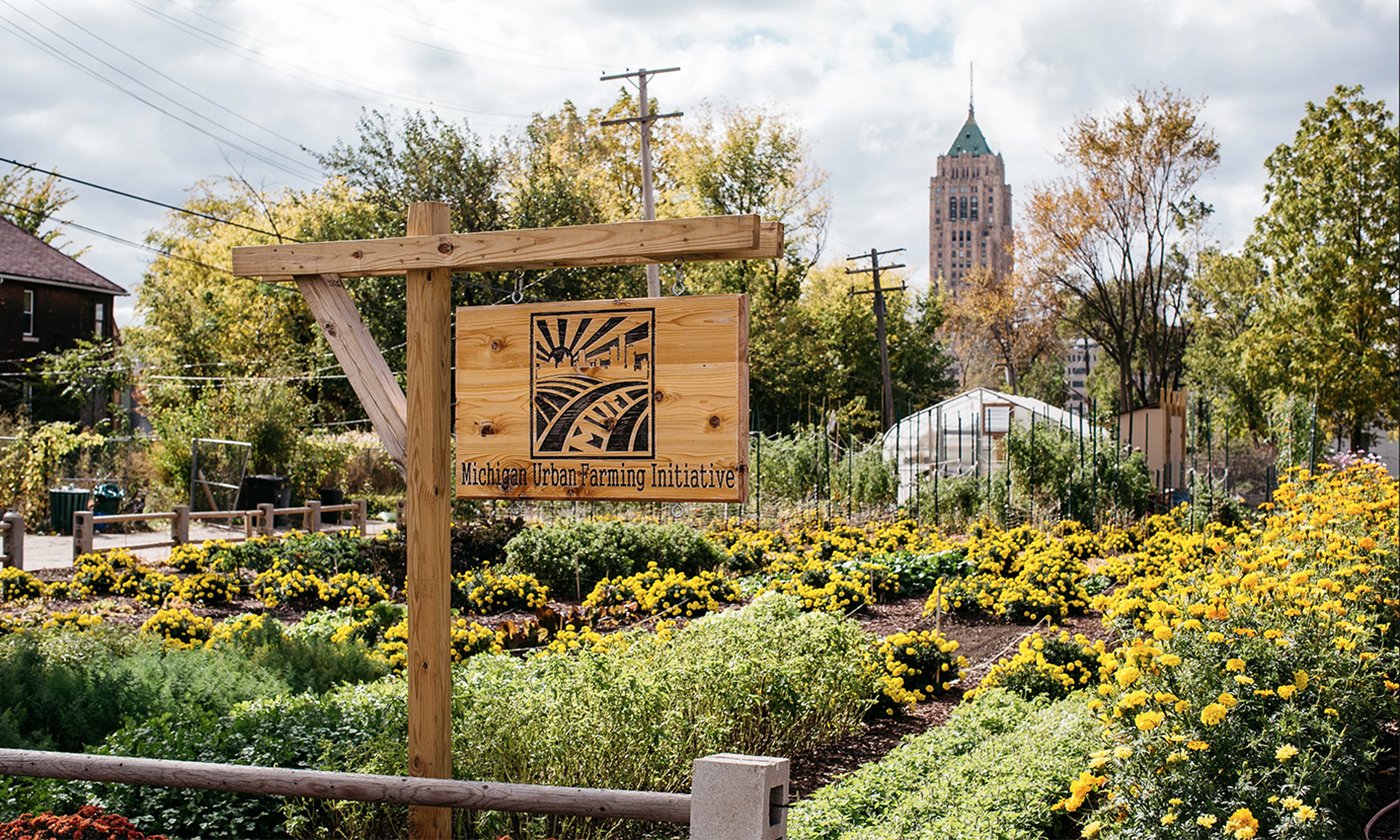Welcome to the Agrihood! Detroit's urban gardens are becoming a whole system of housing, employment and good health
From Yes magazine, photo: Michelle Gerard
Maybe a familiar practice, but we like the new American name for urban and suburban areas which centre residence and work around the growing of food. They call them agrihoods, short for agricultural neighbourhoods. Part of a rebirth of the WWII “victory gardens” tradition that began ten years ago, the Urban Land Institute defines agrihoods as:
master-planned housing communities with working farms as their focus. Overwhelmingly, they have large swaths of green space, orchards, hoop houses and greenhouses, and some with barns, outdoor community kitchens, and environmentally sustainable homes decked with solar panels and composting.
There are 90 nationwide, many of them pitched at affluent millennials - outside urban locations Phoenix, Colorado, Atlanta, and Monterey Bay - who are switching golf courses for green farms (and bringing high-level house prices with them). However, Yes magazine’s piece wants to highlight new forms of agrihood - especially flourishing in Detroit:
Within the city. home to nearly 1,400 community gardens and farms, there is one officially designated agrihood, Michigan Urban Farming Initiative. The nonprofit in the North End neighborhood, just north of the recently gentrified Midtown area, calls itself America’s First Sustainable Urban Agrihood.
It was founded in 2012 and gained its development designation in 2016.
Co-founder Tyson Gersh said at the time, “Over the last four years, we’ve grown from an urban garden that provides fresh produce for our residents to a diverse, agricultural campus that has helped sustain the neighborhood, attracted new residents and area investment.” They’ve received corporate support from Target, BASF, and General Motors.
The Michigan initiative is a 3-acre farm focusing on food insecurity in one of Detroit’s historic communities that was once home to a thriving Black middle class. Now the median home value is under $25,000, and about 35% of the residents are homeowners.
The Detroit agrihood model plans to provide a Community Resource Center with educational programs and meeting space across from the garden, a café, and two commercial kitchens.
“For us, food insecurity is the biggest issue,” says, Quan Blunt, the Michigan initiative’s farm manager. “The closest [fresh] produce store to this neighborhood is Whole Foods [4 miles away in Midtown], and you know how expensive they can be.”
MUFI grows lots of hot peppers and collard greens, because that is what North Enders like, Blunt says. But they’re also an economic opportunity. At MUFI, one of their sustainability goals is to create hot sauces from their fresh peppers to sell. The farm also has rows and rows of other vegetable varieties all dotted with marigolds, which help keep bugs away, organically.
Blunt, who joined the Peace Corps after college to do food security work in India, was born and raised in Detroit, and is proud of the agricultural heritage passed down through his family.
My grandmother grew up in this neighborhood,” says Blunt, a graduate of Michigan State University’s College of Agriculture who majored in Food Science and Environmental Studies. Growing up in Detroit, labeled a “food desert,” was a major motivation for Blunt to enter the agricultural field. “People deserve fresh food,” Blunt says, “I believe good nutrition can help people reach their potential.”
Blunt says MUFI recognizes the importance of being a part of the community, and works closely with the North End Block Club. MUFI has served them in ways such as neighborhood cleanups, he says. With a trip to the farm, one can see that the grass is neatly manicured, even at abandoned property near the area.
“Community members can use our tools, our lawnmower,” Blunt says. “Whenever we get large numbers of volunteers [for the farm], we go first to the block club president to see what she needs done. The goal here is to strengthen the community.”
At MUFI, produce is free to all. The farm is open for harvesting on Saturday mornings.
The free-food concept has been a topic of debate within urban farming communities, particularly those whose focus is food sovereignty, controlling the means of one’s own food production and distribution.
The Detroit Black Community Food Security Network has spent more than a decade working toward this end. The community-based nonprofit membership organization recently celebrated 13 years of service to the city. The Detroit network operates D-Town Farm, the largest of the Detroit’s gardens and farms, on the city’s west side.
“[At D Town] we are most interested in fostering self-determination,” the network’s executive director Malik Yakini says.
More here. We’ve run a lot on urban gardens and food growing - sample this archive.


